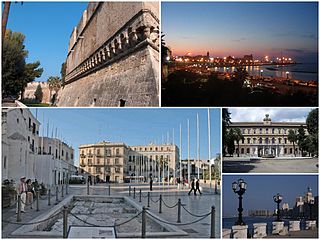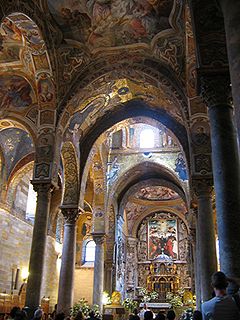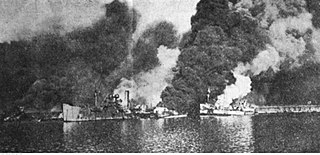
Bari is the capital city of the Metropolitan City of Bari and of the Apulia region, on the Adriatic Sea, in southern Italy. It is the second most important economic centre of mainland Southern Italy after Naples, a port and university city, as well as the city of Saint Nicholas. The city itself has a population of 320,257 inhabitants, over 116 square kilometres (45 sq mi), while the urban area has 750,000 inhabitants. The metropolitan area has 1.3 million inhabitants.

Saint Nicholas of Myra, also known as Nicholas of Bari, was an early Christian bishop of Greek descent from the maritime city of Myra in Asia Minor during the time of the Roman Empire. Because of the many miracles attributed to his intercession, he is also known as Nicholas the Wonderworker. Saint Nicholas is the patron saint of sailors, merchants, archers, repentant thieves, prostitutes, children, brewers, pawnbrokers, unmarried people, and students in various cities and countries around Europe. His reputation evolved among the faithful, as was common for early Christian saints, and his legendary habit of secret gift-giving gave rise to the traditional model of Santa Claus through Sinterklaas.

Roger II was King of Sicily and Africa, son of Roger I of Sicily and successor to his brother Simon. He began his rule as Count of Sicily in 1105, became Duke of Apulia and Calabria in 1127, then King of Sicily in 1130 and King of Africa in 1148. By the time of his death at the age of 58, Roger had succeeded in uniting all the Norman conquests in Italy into one kingdom with a strong centralized government.

Roger I, nicknamed Roger Bosso and The Great Count, was a Norman nobleman who became the first Count of Sicily from 1071 to 1101. He was a member of the House of Hauteville, and his descendants in the male line continued to rule Sicily down to 1194.

William I, called the Bad or the Wicked, was the second King of Sicily, ruling from his father's death in 1154 to his own in 1166. He was the fourth son of Roger II and Elvira of Castile.

The Principality of Taranto was a state in southern Italy created in 1088 for Bohemond I, eldest son of Robert Guiscard, as part of the peace between him and his younger brother Roger Borsa after a dispute over the succession to the Duchy of Apulia.

The Battle of Bitonto was a Spanish victory over Austrian forces near Bitonto in the Kingdom of Naples in the War of Polish Succession. The battle ended organized Austrian resistance outside a small number of fortresses in the kingdom.

Robert II was the count of Aversa and the prince of Capua from 1127 until his death.
Grimoald Alferanites was the prince of Bari from 1121 to 1132.

George of Antioch was the first to hold the office of ammiratus ammiratorum in the Norman Kingdom of Sicily. He was a Syrian-born Byzantine Christian of Greek ancestry. He was born in Antioch, whence he moved with his father, Michael, and mother to Tunisia following the First Crusade. He and his parents found employment under the Zirid emir, Tamim ibn Muizz. George fell out with Tamim's son and successor, Yahya, and secretly left for Christian Sicily by stealing away in disguise aboard a Palermitan ship harbored in Mahdia. Upon arrival in the Sicilian capital, George went immediately to the palace and found service with the Norman count, Roger II.
Ranulf II was the count of Alife and Caiazzo, and duke of Apulia. He was a member of the Italo-Norman Drengot family which dominated the Principality of Capua for most of the century between 1050 and 1150. Ranulf's wife, Matilda, was the sister of King Roger II of Sicily.

The Hauteville was a Norman family originally of seigneurial rank from the Cotentin. The Hautevilles rose to prominence through their part in the Norman conquest of southern Italy. By 1130, one of their members, Roger II, was made the first King of Sicily. His male-line descendants ruled Sicily until 1194. Some Italian Hautevilles took part in the First Crusade and the founding of the Principality of Antioch (1098).

Emanuel Wynn was a French pirate of the 17th century, and is often considered the first pirate to fly the Jolly Roger.

The Norman conquest of southern Italy, also known as The Kingdom In The Sun, lasted from 999 to 1139, involving many battles and independent conquerors.
The siege of Bari took place 1068–71, during the Middle Ages, when Norman forces, under the command of Robert Guiscard, laid siege to the city of Bari, a major stronghold of the Byzantines in Italy and the capital of the Catepanate of Italy, starting from 5 August 1068. Bari was captured on 16 April 1071 when Robert Guiscard entered the city, ending over five centuries of Byzantine presence in Southern Italy.

Wars between the Normans and the Byzantine Empire were fought from c. 1040 until 1185, when the last Norman invasion of the Byzantine Empire was defeated. At the end of the conflict, neither the Normans nor the Byzantines could boast much power as by the mid-13th century exhaustive fighting with other powers had weakened both, leading to the Byzantines losing Asia Minor to the Ottoman Empire in the 14th century, and the Normans losing Sicily to the Hohenstaufen.

The air raid on Bari was an air attack by German bombers on Allied forces and shipping in Bari, Italy, on 2 December 1943, during World War II. 105 German Junkers Ju 88 bombers of Luftflotte 2 achieved surprise and bombed shipping and personnel operating in support of the Allied Italian Campaign, sinking 27 cargo and transport ships, as well as a schooner, in Bari harbour.

The Normans are an ethnic group that arose from contact between Norse Viking settlers of a region in France, named Normandy after them, and indigenous Franks and Gallo-Romans. The settlements in France followed a series of raids on the French coast mainly from Denmark — although some also came from Norway and Sweden— and gained political legitimacy when the Viking leader Rollo agreed to swear fealty to King Charles III of West Francia following the Siege of Chartres in 911 AD. The intermingling of Norse settlers and native Franks and Gallo-Romans in Normandy produced an ethnic and cultural "Norman" identity in the first half of the 10th century, an identity which continued to evolve over the centuries.
Bisantius Guirdeliku was a noble citizen of Bari, then the capital of the Byzantine catepanate of Italy. He held the rank of patrikios. During the siege of Bari (1068–71) by the Normans, he led the faction opposed to surrender until he was assassinated by his rival, Argirizzo, in 1070. His nickname is known from the anonymous Annales Barenses and the chronicle of Lupus Protospatharius.
Bizim Hikaye is a Turkish drama series starring Burak Deniz and Hazal Kaya. It is an adaptation of the UK original series Shameless. The show is popular in Pakistan and India, and its first episode received more than 12 million views. The show was shot in Istanbul and ran for seventy episodes.














